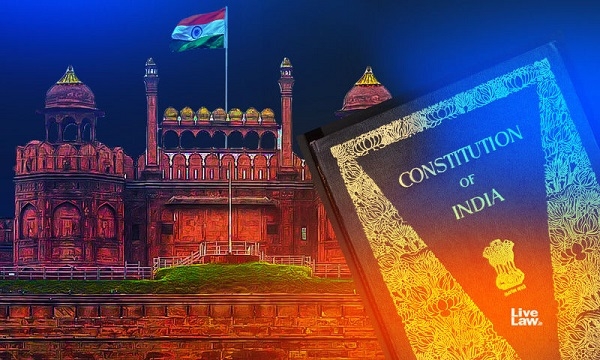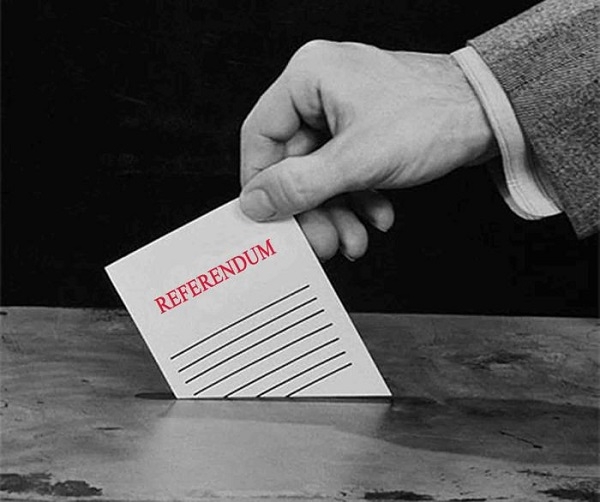Referendum - The Citizens Voice
Total Views |
A referendum is a vote by the citizens of a country to approve or reject any proposal by their government; and the result of a referendum can support or oppose such proposals. It is similar to casting a vote in an election, except that in a referendum, the citizens have the option of writing ‘yes’ or ‘no’ in the opinion box of the proposals. During the referendum exercise the government may put before its citizens one or more proposals for consideration.
It can be argued that referendums play a constructive role in an democracy due to its deliberative role, and helps to focus the nation on events that affect every-day life decisions. It can be further argued that nation-wide deliberative processes work better when they are focused on collective decision-making between the government and the citizens.

Critics can counter-argue that influential politicians can misuse the process for agenda manipulation, yes-or-no questions instead of bilateral dialogue, brute strength of majority politics to extract a favorable decision; et.al. Therefore, it’s necessary to consider referendum as one part of the democratic process and not the system as a whole. To become ‘as democratic as systematically possible’ it needs to be connected to the demands, narratives, claims, deliberations and experiences at one end, and to the Constitutional framework on the other; to ensure a high standard of democratic decisiveness. Basically, it cannot be exclusively the “Citizen’s Will” unless it fits into the accepted parameters of the Constitution of the Nation. However, the process must result in a direct political consequences, supported by policy, adequate allocation of resources and legal enforcement. Only then, can the process be termed as a democratic exercise of the citizen’s policy mandate.
In India, the issue of conducting referendums has been intensely debated since independence from British Rule. There has been a belief that conducting referendums is not permitted in India, since the Constitution has no provision for it and because the Constituent Assembly which ratified the Constitution of India believed that; since elected parliamentarians would truly represent the ‘will of the people’, there was no need for a separate process of referendums. However, in later years, there have been instances when referendums have indeed been conducted in our nation.
In 1948, a referendum was conducted in the princely State of Junaghad, where the citizens voted to accede to the Republic of India [Refer: 1959 AIR 1383, 1960 SCR (1) 537]. Similarly, in 1949, a referendum was conducted in Chandernagore (now part of the Hooghly district in Bengal), which was at that time a French territory; whereby the citizens voted in favor of merging with the Republic of India rather than stay as a free territory controlled by France. Subsequently, the administration of Chandernagore was transferred to India. [Refer: AIR 1960 SC 845, 1960 3 SCR 250]; and also in Pondicherry ( now named Puducherry, a former French territory) where citizens voted to join the Indian Union in 1954.
The last referendum happened in 1975, wherein the inhabitants of Sikkim decided on their merger with India [Anjan Banerjee v. Union of India, Civil Order No. 8509(W) Of 1992 | 29-03-1993]. It should be noted that while the Constitution does not allow for referendums, the tribal areas in the states of Assam, Meghalaya, Tripura and Mizoram, recognised under the Sixth Schedule have incorporated provisions allowing referendums in election matters. [Refer: The United Khasi Jaintia Hills Autonomous District (Appointment and Succession of Chief and Headman) Act, 1959].
The Constitution of India does not contain any references to a referendum, therefore it can be assumed that while referendums are not encouraged, they are also not totally prohibited. In the landmark case of ‘Kesavananda Bharti v. State of Kerala (1973)’ [Writ Petition (civil) 135 of 1970], the Supreme Court laid down the “Basic Structure Doctrine” according to which certain basic features of the Constitution could not be taken away by the Parliament, under its amending powers. In this very case, Justice S.N. Dwivedi had remarked that in India there can be no law for a referendum, as the exclusive procedure for amending the Constitution is Article 368.

However, since governments in the past have conducted referendums, the same is possible now and in the future, to ascertain the will of the people towards major policy decisions or possible amendments to such decisions. It is important to note that the current government of Prime Minister Narendra Modi, in its submission to the Supreme Court in November 2020 on the issue of a referendum to ascertain the views of the citizens, as to whether a new Parliament building should be constructed; stated that “We are not a participative democracy. Fortunately, we are a representative democracy. You cannot seek a referendum. Objections (to environment impact) have been made to the CPWD. These have been considered. Participative democracy is a Utopian idea,” [Solicitor General Tushar Mehta to a three-judge bench led by Justice AM Khanwilkar].
A country as diverse as India needs to hold referendums, in order to have a two-way consistent dialogue between the Government and the People who appointed it into power. While, political parties like to argue that frequent elections act as a platform for citizens to express their views, and that an election can also be considered as a referendum on the basis of agenda and ideology; the converse argument is that elections do not necessarily define national policy and program implementation. Elections are won on promises and lost due to lack of performance. Sometimes, they are re-won on performance delivered; but in every circumstance the citizens have to gamble five years or more of their lives without guarantee of achieving national goals.
The lack of a referendum policy carry’s the risk of stifling the voices of those who are marginalized due to various reasons, across various sections of society. Governments seem to be averse to referendums which carry the inherent risks of refusal of the governments proposals, and because even the Supreme Court would be hesitant to overturn the results of the process, knowing that the opinion of the citizens is supreme. The question that should concern us all is that; had the government of Prime Minister Modi conducted referendums on the Citizens Amendment Act (CAA), National Registry of Citizens (NRC) and the three Farm Bills 2020; would the government have been in a better position to clarify the doubts raised by those opposed to it, convince the majority, of the benefits of these laws towards the security of the nation, and more importantly; would it have prevented the violence and chaos that negatively impacted commercial activities and, law and order?
References:
1. Advocate Swapnil Tripathi / The Basic Structure Blog
2. M.N Roy’s Constitution of Free India
3. Ministry of External Affairs [MEA], Government of India.

